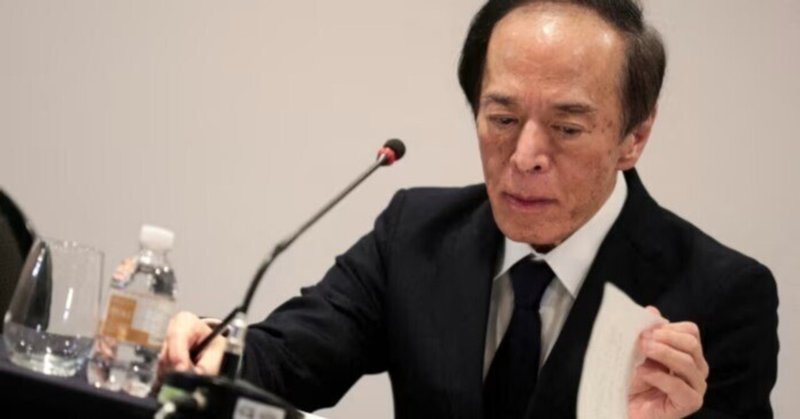
日銀がマイナス金利時代を終了/FTを読む
Bank of Japan ends era of negative interest rates
日銀がマイナス金利時代を終了
Central bank becomes world’s last to unwind ultra-loose monetary policy after signs of lasting end to decades of deflation
数十年にわたるデフレ脱却の兆しが見えた後、中央銀行は世界で最後に超金融緩和政策を解除する。
The Bank of Japan has raised interest rates for the first time since 2007, becoming the world’s last central bank to end negative rates as the country puts decades of deflation behind it.
日本銀行は2007年以来初めて金利を引き上げ、数十年にわたるデフレから脱却する中、マイナス金利を廃止した世界で最後の中央銀行となった。
Following a 7-2 majority vote, the BoJ said it would guide the overnight interest rate to remain in a range of around 0 to 0.1 per cent.
7対2の多数決を受け、日銀は翌日物金利を0-0.1%程度の範囲にとどまるよう誘導すると発表した。
The central bank also removed its yield curve controls, a policy it began in 2016 to reinforce its ultra-loose monetary measures by capping the yields of 10-year Japanese government bonds.
中銀はまた、10年物日本国債の利回りに上限を設けることで超緩和金融政策を強化するために2016年に始めたイールドカーブ・コントロールも解除した。
The widely expected move on Tuesday came after workers at some of Japan’s largest companies secured their biggest pay rise since 1991, giving BoJ governor Kazuo Ueda enough confidence that mild inflation will continue.
火曜日の広く予想されていた動きは、一部の日本最大手企業の従業員が1991年以来最大の賃上げを確保したことを受けて行われ、日銀総裁の植田和男氏に緩やかなインフレが続くとの十分な自信を与えた。
The BoJ was one of a number of central banks to turn to negative interest rates as a radical policy measure. It introduced negative rates in 2016 as it tried to encourage banks to lend more to generate spending and contain the risks of a global economic slowdown.
日銀は、抜本的な政策手段としてマイナス金利に舵を切った数多くの中央銀行のうちの一つである。 政府は支出を生み出し、世界経済減速のリスクを抑制するために銀行の融資拡大を奨励しようとして、2016年にマイナス金利を導入した。
The end to one of the most contentious economic experiments of recent times comes as signs emerge of broader change in the Japanese economy.
日本経済に広範な変化の兆しが現れる中、最近最も物議を醸した経済実験の一つが終了することになった。
In February the Nikkei 225 stock index finally surpassed the level reached 34 years ago, while more companies are passing on the costs of inflation to consumers and labour shortages are contributing to higher wages.
2月、日経平均株価はついに34年前の水準を超えたが、インフレのコストを消費者に転嫁する企業が増え、労働力不足が賃金上昇に寄与している。
Still, the BoJ’s pledge to keep buying Japanese government bonds on Tuesday underscores the continuing weakness in the economy, as household consumption has remained sluggish.
それでも、日銀が火曜日に日本国債の買い入れを続けると表明したことは、家計消費が依然として低迷していることから、経済の継続的な弱さを浮き彫りにしている。
Inflation, which was sparked by a rise in imported energy and food prices, is well beyond its peak. Core inflation, excluding volatile fresh food prices, slowed in January for the third straight month.
輸入エネルギーと食料価格の上昇によって引き起こされたインフレは、ピークをはるかに超えている。 不安定な生鮮食品価格を除くコアインフレ率は1月に3カ月連続で鈍化した。
Despite the return to positive interest rates, economists said rates were likely to stay very low for the foreseeable future, and BoJ officials do not see the first rise as a signal that more will quickly follow.
プラス金利に戻ったにもかかわらず、エコノミストらは、金利は当面は非常に低い水準にとどまる可能性が高いと述べ、日銀当局者らは、最初の金利上昇がすぐにさらなる金利上昇が続く兆候だとは考えていない。
“Given the current outlook for economic activity and prices, the bank anticipates that accommodative financial conditions will be maintained for the time being,” the BoJ said.
「現在の経済活動と物価の見通しを踏まえると、当面は緩和的な金融環境が維持されると銀行は予想している」と日銀は述べた。
As part of the new framework, the BoJ will apply an interest rate of 0.1 per cent to deposits held with the central bank. It will discontinue purchases of exchange traded funds and Japan real estate investment trusts, but said it would continue to buy roughly the same amount of JGBs as it does now — about ¥6tn per month.
新たな枠組みの一環として、日銀は中央銀行に保有する預金に0.1%の金利を適用する。 上場投資信託(ETF)と日本不動産投資信託の買い入れは中止するが、現在とほぼ同額(月額約6兆円)の国債買い入れは継続すると発表した。
Sayuri Shirai, a former BoJ board member who opposed the introduction of negative interest rates, said the BoJ’s decision appeared to be driven more by the feeling that “now is the only time to act”, with uncertainty expected in the months ahead due to US elections as well as a potential change in Japanese premiership.
マイナス金利導入に反対していた元日銀理事の白井さゆり氏は、日銀の決定は、米国の選挙や日本の首相交代の可能性によって数ヶ月先には不確実性が予想されるため、「行動するには今しかない」という思いがより強いようだと述べた。
“The economic conditions are not yet in place. The fact that the BoJ decided to move based on spring wage talks alone shows that they were in a rush to end negative interest rates,” Shirai said.
「経済状況はまだ整っていません。 日銀が春季賃金交渉だけを根拠に決定したという事実自体が、マイナス金利の解除を急いでいることを示している」と白井氏は語った。
On Tuesday, the yen edged higher after the announcement but was still 0.4 per cent down against the US dollar at ¥149.74. The Nikkei Stock Average briefly rose after the BoJ decision but was down 0.5 per cent.
火曜日、この発表を受けて円は若干上昇したが、依然として対米ドルで0.4%安の149.74円だった。 日銀の決定後、日経平均株価は一時上昇したが、0.5%下落した。
英語学習と世界のニュースを!
自分が関心があることを多くの人にもシェアすることで、より広く世の中を動きを知っていただきたいと思い、執筆しております。もし、よろしければ、サポートお願いします!サポートしていただいたものは、より記事の質を上げるために使わせていただきますm(__)m
